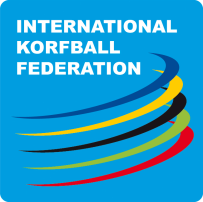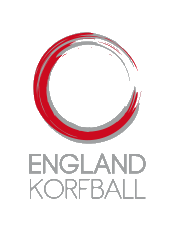
Korfball is a ball sport, with similarities to netball and basketball. It is played by two teams of eight players with four female players and four male players in each team. The objective is to throw a ball into a netless basket that is mounted on a 3.5 m high pole.

The International Korfball Federation (IKF) is the governing body of korfball. IKF is responsible for the organisation of korfball's major international tournaments, notably the IKF World Korfball Championship.
European Korfball Championship or European Korfball A-Championship is a korfball competition for European national teams organized by the International Korfball Federation. It was played every four years from 1998 until 2014 and then moved to a tournament every two years, starting from 2016. The number of participated teams has varied between 8 and 16. The Netherlands national korfball team has won each edition.
The Czech Republic national korfball team is managed by the Czech Korfball Association (CKA), representing the Czech Republic in korfball international competitions.

The Netherlands national korfball team represents the Netherlands in international korfball. It is controlled by the Royal Dutch Korfball Association (KNKV), the governing body of korfball in the Netherlands.

The Belgium national korfball team, nicknamed the Belgian Diamonds, is managed by the Koninklijke Belgische Korfbalbond (KBKB), representing Belgium in korfball international competitions.
The Chinese Taipei national korfball team is managed by the Chinese Taipei Korfball Association (CTKA), representing Taiwan in korfball international competitions.

The England national korfball team is managed by the English Korfball Association (EKA), representing England in korfball international competitions. In 2007 the Great Britain national korfball team was split into 3 national teams: England, Wales and Scotland, that compete in all international competitions except the World Games, where they compete as a unified Great Britain national korfball team.
The Australia national korfball team is managed by Korfball Australia (KA), representing Australia in international korfball competitions, including the Asia-Oceania Korfball Championship, the IKF World Korfball Championship and The World Games.
The South Africa national korfball team is managed by the South African Korfball Federation (SAKF), representing South Africa in korfball international competitions.
The Hungary national korfball team is managed by the Magyar Korfball Szövetség (MKS), representing Hungary in korfball international competitions.
The Russia national korfball team is managed by the Russian Korfball Federation (RKF), representing Russia in korfball international competitions.

The Poland national korfball team, is managed by the Polski Związek Korfballu (PZKorf), representing Poland in korfball international competitions.
The India national korfball team is managed by the Korfball Federation of India (KFI), representing India in korfball international competitions.
The Hong Kong national korfball team is managed by the Hong Kong China Korfball Association (HKCKA), representing Hong Kong in Korfball international competitions.
The New Zealand national korfball team, nicknamed The Korus, is the national team representing New Zealand in korfball international competitions. The team is managed by Korfball New Zealand (KNZI). The name The Korus is one of many national team nicknames (indirectly) related to the All Blacks and/or the New Zealand silver tree fern.
The Wales National Korfball Team often referred to as the Welsh Korfball Squad (WKS) is managed by the Welsh Korfball Association/Cymdeithas Pêl-Corff Cymru, and represents Wales in international korfball competition. The Welsh Korfball Squad entered its first IKF ranking competition in 2007, after the Great Britain national korfball team was disbanded to produce three teams: England, Wales and Scotland. Wales is a fully recognised member of the International Korfball Federation and is currently ranked 18th in the world.
The IKF World Korfball Championship is an international korfball competition contested by the national teams of the members of International Korfball Federation (IKF), the sport's global governing body. The championship has been awarded roughly every four years since the inaugural tournament in 1978. The current champions are the Netherlands, who won the 2019 IKF World Korfball Championship.
All-Africa Korfball Championship (AAKC) is a korfball competition for African national teams organized by the International Korfball Federation. It has been held every four years since 2006 with the winner qualifying through to the IKF World Korfball Championship in the following year.
The Philippines national korfball team is the team which represents the Philippines in international korfball competitions. It is sanctioned and managed by the Philippine Korfball Federation.





